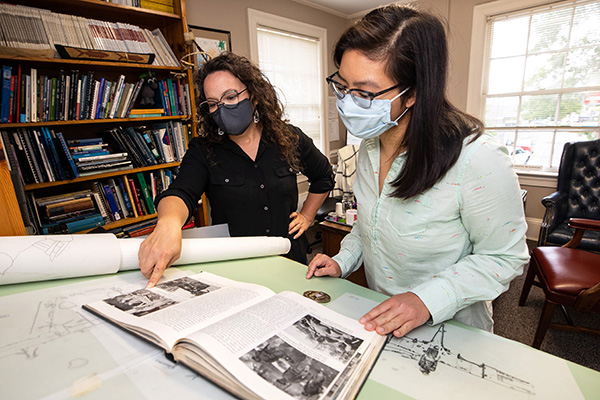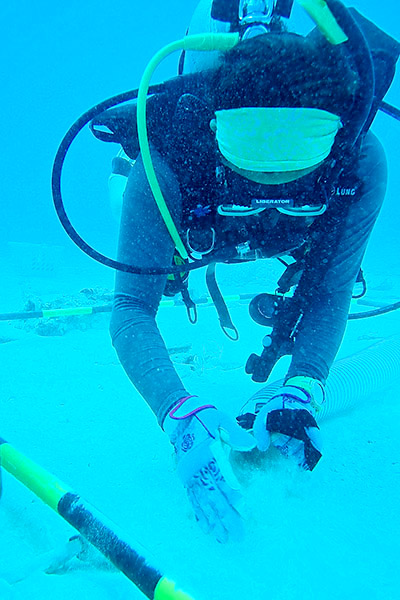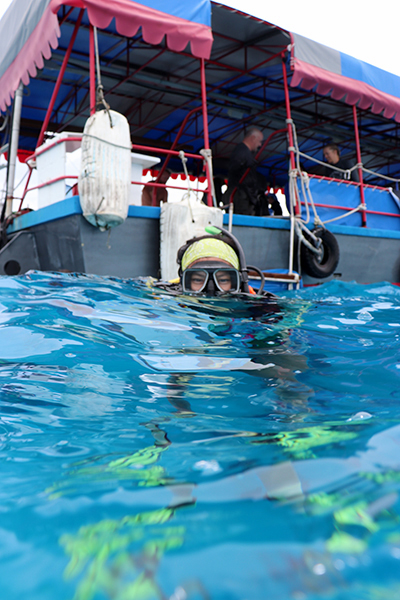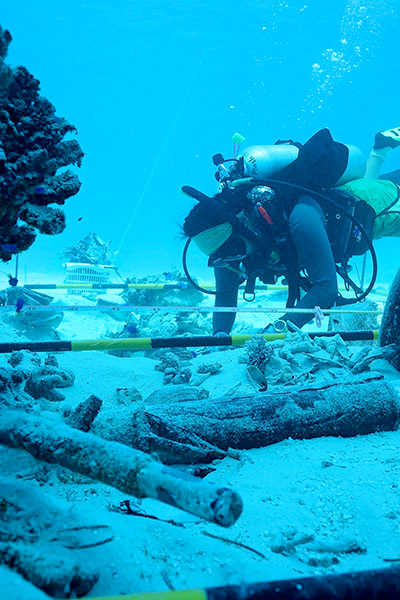Our Community Platform providing Essential Information to Know what is Real
Encouraging Archaeological Diversity
Publisher's Note: This post appears here courtesy of ECU News Services. The author of this post is Lacey L. Gray.

Preserving history and heritage is a prominent goal in the field of archaeology, and East Carolina University's Maritime Studies Program helps students gain the knowledge to meet that goal through real-world experiences and supportive professors. The program, housed in the Thomas Harriot College of Arts and Sciences Department of History, makes an impact on many students' lives, one so much so, that she applied for a fellowship that has allowed her to continue the valuable work she loves at ECU.

The DPAA is a U.S. government agency responsible for locating, recovering and identifying the remains of unaccounted-for Department of Defense personnel from designated past conflicts. Their mission involves historical research, archaeology, forensic anthropology, laboratory analyses and other related activities. Fellows help with the mission to recover lost service members.
"The program in maritime studies is delighted to be a partner of DPAA and to work on their important mission," McKinnon said. "The partnership provides our program and its faculty and students with the opportunity to put into practice our skills and research in underwater archaeology. It also provides a tangible and meaningful opportunity for underwater archaeology to contribute to society."
Tan said it is because of ECU's maritime studies professors, specifically her mentor McKinnon, that she applied for the fellowship that would keep her at ECU.
"The professors are very supportive of students and provide them with the resources and connections to meet their research or professional goals," Tan said. "Dr. McKinnon is a great professor and mentor. One of my favorite aspects about her is that she listens well and provides valuable guidance so I can make informed decisions about my future. Dr. McKinnon is also very committed to improving diversity, equity and inclusion in maritime archaeology, which I value and appreciate very much being that I am only one of a few Asian American maritime archaeologists."
Through the fellowship, Tan conducts historical research and geospatial analysis in support of the DPAA mission.

McKinnon said, "We've had the great fortune of having three wonderful fellows over the past several years. Aleck brings an incredible skillset to her position that ranges from GIS management and analysis to outreach and engagement. We are lucky to have her in this position and to be teaching our undergraduates as well."
A portion of Tan's fellowship includes teaching one course a year while she is at ECU. This spring, Tan taught the maritime studies battlefield archaeology class. The class, which averages 10 students per year, is usually taught to graduate students only, but this year the course was made available to undergraduates as well.
"Students learn about battlefields and conflicts both on land and underwater and study some of the most well-known conflicts across the globe," Tan said. "A diverse range of perspectives and case studies from ancient to modern conflicts are covered."
Senior university studies major Sean Mitchell said he enjoyed the breadth of conflicts covered in the course. "Ms. Tan and Dr. McKinnon also discussed the role that organizations like the DPAA play in battlefield archaeology. Many of these volunteers are former service personnel who dedicate their time to collecting and providing information relating to missing personnel to their family members and the community."
As with many courses last year, the coronavirus changed the way Tan's class was taught. It moved to a virtual format, where students conducted readings and viewed lecture content prior to class. Tan included a variety of digital content in the class, incorporating podcasts, YouTube videos and discussion boards, where students analyzed content or presented information about varying battlefield and conflict sites that they were interested in. Weekly guest speakers shared their knowledge and expertise of the field.
"One thing I really appreciated, especially during COVID, was Ms. Tan's dedication and compassion toward her students. She was always available," said Mitchell, whose goal is to teach high school social studies. "I think many people in academia have an intimidating air of authority that makes them difficult to approach. Ms. Tan seemed to exude a confidence in her understanding of the material as well as a warm lightheartedness that was comforting, especially during this time of isolation and virtual learning. My experience with Ms. Tan as an instructor has influenced the way I intend to approach my class as a teacher."
Tan said she also aimed to introduce more diverse topics, including women's contributions to war efforts and Indigenous and Asian American conflict history.
"We covered some of the less represented aspects of WWII," Mitchell said. "It is often taught that women worked in factories to help with production for the war effort, or as nurses caring for wounded servicemen, but what I found interesting was how many women worked in counterintelligence as spies or codebreakers. Women, and especially women of color, would have their contributions overlooked for decades before gaining any public recognition."
If teaching and research did not sound like enough, Tan created a summer volunteer internship opportunity for two to three students to assist with DPAA missions and case studies.

Tan and McKinnon recently learned that funding of the partnership with ECU and the DPAA has been approved for an additional two years, allowing Tan to remain at ECU and continue her important work.
Tan's goal is to encourage continued diversity in the field of archaeology.
"Because our backgrounds may affect the topics we research, it is crucial that there is a diverse community of archaeologists to preserve an inclusive history and heritage," she said. "I am a successful female minority archaeologist, but my goal is to improve diversity, equity and inclusion in our field. To meet these goals, I want to keep developing my skills as an archaeologist specializing in geospatial analysis, sharing and researching diverse topics in archaeology and helping support other minority archaeologists."
Go Back

Aleck Tan, who received her masterís degree in maritime studies from ECU in 2020, has spent the past year as ECUís Defense POW/MIA Accounting Agency (DPAA) Research Partner Fellow. | Photo: Rhett Butler
Preserving history and heritage is a prominent goal in the field of archaeology, and East Carolina University's Maritime Studies Program helps students gain the knowledge to meet that goal through real-world experiences and supportive professors. The program, housed in the Thomas Harriot College of Arts and Sciences Department of History, makes an impact on many students' lives, one so much so, that she applied for a fellowship that has allowed her to continue the valuable work she loves at ECU.

Dr. Jennifer F. McKinnon, left, and Tan conduct research at the Eller House. | Photo: Rhett Butler
The DPAA is a U.S. government agency responsible for locating, recovering and identifying the remains of unaccounted-for Department of Defense personnel from designated past conflicts. Their mission involves historical research, archaeology, forensic anthropology, laboratory analyses and other related activities. Fellows help with the mission to recover lost service members.
"The program in maritime studies is delighted to be a partner of DPAA and to work on their important mission," McKinnon said. "The partnership provides our program and its faculty and students with the opportunity to put into practice our skills and research in underwater archaeology. It also provides a tangible and meaningful opportunity for underwater archaeology to contribute to society."
Tan said it is because of ECU's maritime studies professors, specifically her mentor McKinnon, that she applied for the fellowship that would keep her at ECU.
"The professors are very supportive of students and provide them with the resources and connections to meet their research or professional goals," Tan said. "Dr. McKinnon is a great professor and mentor. One of my favorite aspects about her is that she listens well and provides valuable guidance so I can make informed decisions about my future. Dr. McKinnon is also very committed to improving diversity, equity and inclusion in maritime archaeology, which I value and appreciate very much being that I am only one of a few Asian American maritime archaeologists."
Through the fellowship, Tan conducts historical research and geospatial analysis in support of the DPAA mission.

Joint Recovery Team, pictured here in Saipan in 2018, is composed of the Task Force Dagger Foundation, ECUís Maritime Studies Program and the Florida Public Archaeology Network. | Photo: Contributed
McKinnon said, "We've had the great fortune of having three wonderful fellows over the past several years. Aleck brings an incredible skillset to her position that ranges from GIS management and analysis to outreach and engagement. We are lucky to have her in this position and to be teaching our undergraduates as well."
A portion of Tan's fellowship includes teaching one course a year while she is at ECU. This spring, Tan taught the maritime studies battlefield archaeology class. The class, which averages 10 students per year, is usually taught to graduate students only, but this year the course was made available to undergraduates as well.
"Students learn about battlefields and conflicts both on land and underwater and study some of the most well-known conflicts across the globe," Tan said. "A diverse range of perspectives and case studies from ancient to modern conflicts are covered."
Senior university studies major Sean Mitchell said he enjoyed the breadth of conflicts covered in the course. "Ms. Tan and Dr. McKinnon also discussed the role that organizations like the DPAA play in battlefield archaeology. Many of these volunteers are former service personnel who dedicate their time to collecting and providing information relating to missing personnel to their family members and the community."
As with many courses last year, the coronavirus changed the way Tan's class was taught. It moved to a virtual format, where students conducted readings and viewed lecture content prior to class. Tan included a variety of digital content in the class, incorporating podcasts, YouTube videos and discussion boards, where students analyzed content or presented information about varying battlefield and conflict sites that they were interested in. Weekly guest speakers shared their knowledge and expertise of the field.
"One thing I really appreciated, especially during COVID, was Ms. Tan's dedication and compassion toward her students. She was always available," said Mitchell, whose goal is to teach high school social studies. "I think many people in academia have an intimidating air of authority that makes them difficult to approach. Ms. Tan seemed to exude a confidence in her understanding of the material as well as a warm lightheartedness that was comforting, especially during this time of isolation and virtual learning. My experience with Ms. Tan as an instructor has influenced the way I intend to approach my class as a teacher."
Tan said she also aimed to introduce more diverse topics, including women's contributions to war efforts and Indigenous and Asian American conflict history.
"We covered some of the less represented aspects of WWII," Mitchell said. "It is often taught that women worked in factories to help with production for the war effort, or as nurses caring for wounded servicemen, but what I found interesting was how many women worked in counterintelligence as spies or codebreakers. Women, and especially women of color, would have their contributions overlooked for decades before gaining any public recognition."
If teaching and research did not sound like enough, Tan created a summer volunteer internship opportunity for two to three students to assist with DPAA missions and case studies.

McKinnon briefs the team before diving during a trip to Saipan in 2019. | Photo: Caleb Brewer
Tan and McKinnon recently learned that funding of the partnership with ECU and the DPAA has been approved for an additional two years, allowing Tan to remain at ECU and continue her important work.
Tan's goal is to encourage continued diversity in the field of archaeology.
"Because our backgrounds may affect the topics we research, it is crucial that there is a diverse community of archaeologists to preserve an inclusive history and heritage," she said. "I am a successful female minority archaeologist, but my goal is to improve diversity, equity and inclusion in our field. To meet these goals, I want to keep developing my skills as an archaeologist specializing in geospatial analysis, sharing and researching diverse topics in archaeology and helping support other minority archaeologists."
| Biting Research | East Carolina University, School News, The Region, Neighboring Counties | Battling Bias |
























